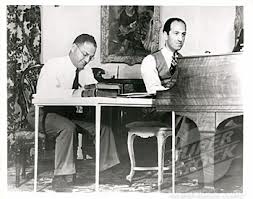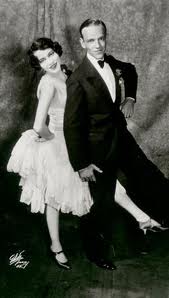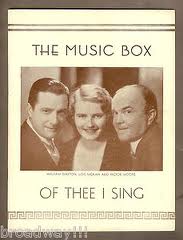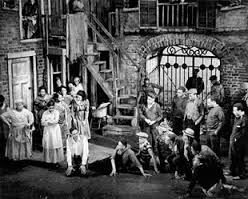Brothers George and Ira Gershwin were a formidable team, creating music and lyrics for Broadway musicals and Hollywood films. Although George Gershwin was classically trained, he managed to utilize American idioms such as jazz in his music. His first hit was “Swanee,” which sold over a million copies of sheet music and became the anthem for one of America’s greatest performers Al Jolson. “Swanee” serves as an example of George Gershwin’s versatility, as the master composer utilized jazz rhythms and Southern minstrel idioms in a song with which America fell in love.
George and Ira Be Good
George wrote “Swanee’ in 1919 with lyricist Irving Caesar. George would collaborate with various lyricists until 1924 when he teamed up with his brother, Ira. With Ira, George Gershwin would compose some of his best work.
In 1924, the two created their first Broadway hit, Lady Be Good! In working together, they created songs that featured masterful tunes, wonderful rhythms, and mature lyrics. The Broadway premiere of Lady Be Good premièred was on December 1, 1924 at the Liberty Theatre. The hit musical closed on September 12, 1925, running for 330 performances. It starred brother and sister Fred and Adele Astaire.
Although the Gershwin brothers did not write all of the numbers for the musical, they did create the majority of the songs, including the hits “Fascinating Rhythm,”
“Oh, Lady be Good!,” and ‘The Half of it, Dearie’ Blues.”
Hits and More Hits
Together, George and Ira wrote numerous hits including such standards as “I Got Rhythm,” “Embraceable You,” “The Man I Love,” “Someone to Watch Over Me,” and “They Can’t Take That Away from Me.” With DuBose Heyward, Ira wrote the lyrics for George’s classic American folk opera Porgy and Bess (1935). Together, the brothers created the music and lyrics for over a dozen Broadway musicals and more than four Hollywood films.
Although George created masterful musical works such as “An American Paris,” which utilized his classical background, with Ira he was able to develop songs that tapped into American idioms. Like Ira’s lyrics, George’s tunes were clever, memorable, and tuneful. It hard not to hum a Gershwin tune.
In 1932 with George S. Kaufman and Morrie Ryskind, the brothers wrote the first musical to win the Pulitzer Prize for Drama, Of Thee I Sing. Of Thee I Sing was a clever sendup of the American political system.
George’s Death
In 1937, George Gershwin experienced violent headaches and often complained that he smelled burning rubber. He experienced extreme mood swings and on June 23 he tried to push his valet, Paul Mueller, out of a running car. He was sent to Cedars of Lebanon Hospital in Los Angeles for observation. Although the hospital ran various tests, the results were negative as no physical cause could be detected for his alarming behavior. On June 26, George was released with a diagnosis of “likely hysteria”.
But his condition worsened and on July 9 he collapsed as he worked on the score of The Goldwyn Follies. George was rushed back to Cedars of Lebanon where he fell into a coma. It was discovered that he had a brain tumor After undergoing surgery, he died on July 11.
End of an Era
The sudden death of George Gershwin marked the end of an era for the Broadway musical. George Gershwin took classical and popular forms and managed to use them to create his own new, unique voice. Ira gave voice to lyrics that deftly matched his brother’s rhythms, tempos, and tunes and that ably defined character, situation, and conflict.
After his brother died, Ira stopped writing for close to four years. However, he became active again creating lyrics for some of the greatest Broadway composers, including Jerome Kern, Kurt Weill, and Harold Arlen. Ira died on August 17, 1983 at the age of 86.
Next in our series we look at the team of Rodgers and Hart. They were one of the most inventive teams in Broadway history. After that we’ll consider a man who stood alone amongst all composers and lyricists, Cole Porter. Porter may have been the cleverest Broadway lyricist of all time and one of its most extraordinary tunesmiths.




